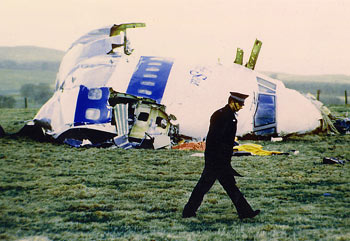Parr is a long-time resident of Lockerbie, a horse-lover and chemist for the local government. He's also a volunteer search-and-rescue worker. So he and his dog spent the night of December 21, 1988, finding and marking dozens of the 259 bodies that fell from the sky. On a driving tour of the places he went that night, he looks out the window at the rolling green of a municipal golf course on the edge of Lockerbie. His voice falters and his eyes fill up. "I hadn't realized. I thought I'd managed to put a lot of it behind. But it's all these hills at the back here. This is where the large number of bodies were found."
Parr says that night planted a seed of anger that flourishes inside him to this day. "There were a lot of us, and I wasn't alone, but I'll stand there and I'll say it: If somebody had said, 'Here's a gun, these are definitely the people who did it,' I would have pulled the trigger, even though I know it [would be] wrong," Parr says. "Looking back now, I think that would have been too good for them." Parr admits his anger, though deep and lasting, is only that of an unlucky volunteer forced to confront the mayhem. The young women whose bodies he found were strangers to him. They were someone else's daughters. Jane and Jim Swire, whose daughter Flora died over Lockerbie, say they yearn to see someone punished - but it must be the right people. "Whatever [the Libyan defendants] are accused of, however horrendous their deeds are alleged to have been, they are entitled to a presumption of innocence, unless and until they're found guilty," Jim Swire says. The Swires spend their summers on Scotland's Isle of Skye, a couple of hundred miles from Lockerbie. The family's vacation home overlooks windswept coastland dotted with sheep, highland cattle, and crofts - small stone houses painted white. Flora Swire loved Skye, says her mother, Jane. "Whenever I see the sea sparkling and the mountains purple and the sky shot with tangerine and blue, I think, Flora should be seeing this. She should be here to enjoy this, with her family. And I know she never can. And that just highlights the cruelty and the sadness." If Abdelbaset Megrahi and Al-Amin Fhimah killed Flora and 269 other people, the Swires say, they hope that will become clear at the trial. But Jim Swire says his grief is made worse by a suspicion that the main culprits behind the bombing got away. "Overwhelmingly, the one thing that matters and keeps coming to the surface is our loss and more importantly Flora's loss. She lost the rest of her life, we've lost her lovely company for the rest of our lives. But, yes, the failure to get to the root of it has kept my anger burning." The Lockerbie bombing has been called the world's biggest unsolved murder. Some who lost loved ones on Pan Am 103 say they're afraid that won't change - no matter what the verdict in the Netherlands. |


